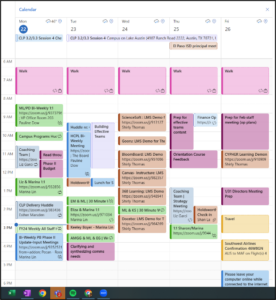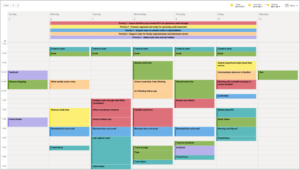 As the to-do’s for the summer and fall start to pile up, we may find ourselves saying “yes” to every request or new idea that comes our way.
As the to-do’s for the summer and fall start to pile up, we may find ourselves saying “yes” to every request or new idea that comes our way.
Our instincts have good intentions, we WANT to be helpful, we’re excited too, and we see SO MUCH MORE free time in the fall. But oftentimes we overcommit…and then find ourselves scrambling
In recent conversations with teachers, school leaders and district-level team members, we have seen a few things be helpful when someone asks you to . . . I don’t know. . . run Saturday tutoring, oversee testing coordination, or start producing weekly data reports.
And hey, we get it. Sometimes you have a choice whether you take on the work, and sometimes you don’t. Either way, the tips below should be helpful when negotiating the workload with colleagues and supervisors.
The Moment You Are Asked to Take On Something New
- Ask for a deadline. Don’t assume everything has to be done right away–even when the request comes from a supervisor. In fact, assume the opposite. As a recent Together Professional webinar participant shared,
“I find asking for additional details can help reduce the stress of the last minute requests that come up. Sometimes I feel like the manager doesn’t actually realize what they are fully asking for until someone asks clarifying questions, so it helps to talk it through. I’ve had this happen and then when I started asking clarifying questions, they realized, ‘Oh, this isn’t too complicated after all!’ or ‘Oh, you know, we don’t really need to do this right now.’ “
- Ask the “asker” how long he or she anticipates the project will take. Do you see this as a two hour thing or an eight hour thing? Does it have to be done RIGHT at this moment or is next month a possibility?
- Brainstorm a partial product that could begin to help meet the need. For example, can I get you last year’s data by Friday and then add 10 years’ worth in a few weeks?
- Articulate the trade-offs you are making so they will be clear to your manager. Yes, I can pull that off today, but it means I will need an extension on XYZ. This one assumes you’ve already decently planned your own work.
- Proactively collect input on your priorities on a monthly basis. Force your supervisor(s) to weigh in. Teachers can do this, too, with principals, deans or coaches.
And Later. . . For Leaders
- Co-plan with other teams to align on cycles and needs
- Create clear and reliable deliverables with deadlines for items your team is frequently asked for, e.g. certain bits of data, your classroom’s attendance, etc.
- List the last-minute requests you’re receiving, and compare notes with another team. A principal may be far more responsive if you show a list of requests from a specific department or program.
- Establish a recurring “huddle time” with your team. Another webinar participant described, “Managers hold on ‘urgent’ requests until the huddle time (could be the very start of each day) to negotiate workloads across the team.” This also keeps team members on the same page about who is responsible for what.
Updated Resource: Saying No Without Being Negative
Together Group Discussion Question: How about you? What have you seen be helpful in managing requests from others?


